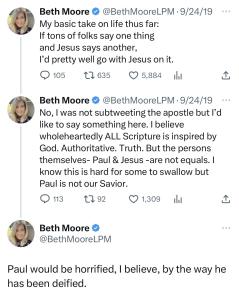Beth Moore
A recent Tweet by Beth Moore is a curiosity and it points to a misuse of a method of Biblical interpretation, the Jesus Criterion among, Baptists and other evangelical Christians.

In 1994 Beth Moore founded Living Proof Ministries to teach women the Scriptures.[1] Since then Moore has become a beloved author and teacher, selling 17.5 million copies of her Bible studies. Once the darling of the SBC, Moore has left the denomination to be part of an Anglican Congregation in her native Houston Texas. While she has left the SBC, she continues to be hounded on Twitter by SBC pastors and leaders who refer to her as a liberal, heretic, and sometimes worse. I find no evidence of either of those charges and often wonder why there is such venom against a woman who no longer associates with the SBC. [2]
Now the charge that Moore is a liberal does not seem to have much merit, but something she said on Twitter recently has made her critics respond with online rants and spittle-producing tirades.
My basic take on life so far: If tons of folks say one thing and Jesus says another, I’d pretty well go with Jesus on it. No, I was not subtweeting the apostle, but I’d like to say something wholeheartedly, all Scripture is inspired by God. Authoritative. Truth. But the persons themselves–Paul & Jesus–are not equals. I know this is hard for some to swallow but Paul is not our Savior. Paul would be horrified, I believe, by the way he has been deified.

I Have Questions
While I do not think Moore has suddenly become like the appalling Nadia Bolz-Weber[3] or late ex-evangelical Rachel Held Evans[4], I do have questions. Who, exactly, is deifying Paul? I know of no one who does that. Who says Paul and Jesus are equals? Again, I know no one who does that. If Paul knew of someone who was doing that, he would be horrified as Moore rightly states.
I read broadly and deeply in the Christian theological tradition, however, and see no evidence of her charge. It could be that she has in mind some of the relentless Twitter trolls that attacked her with vile accusations and doxxed her church. She may be referring to some ministers who treat her with public contempt despite the Scriptural mandate to avoid quarrelsome behavior. Those are possibilities, but there is no way to be sure who Moore has in mind, as she does not elaborate.
A Concern
I am concerned that Moore is adopting a pattern of Biblical interpretation that is destructive and pervasive. The pattern is a misuse of a section of the 1963 Baptist Faith & Message’s statement on the Scriptures. The phrase many Baptists and others misuse is, “… The criterion by which the Bible is to be interpreted is Jesus Christ.”[5] Baptists often call this phrase the “Jesus Criterion,” and it means that the focus of the Scriptures is the life and ministry of Jesus Christ.
Looking at the Bible Through Jesus
Here is one way to understand the Jesus Criterion. Genesis presents us with the nature of creation and the broken world around us. It begins with beauty and ends with Joseph’s death. It reveals disordered relationships and human cruelty. Exodus tells us the story of Moses and the liberation of Israel from slavery and God’s giving of the 10 Commandments. As the Law, Prophets, and Writings of the Old Testament continue, we read of God working through the people of Israel and the promise of a Messiah to rescue them.
In the Gospels, we read the story of Jesus. Jesus is a miracle worker, Israel’s Messiah, the Lord, the King of Israel, the Risen Savior. In Acts, we read the history of the early Church. The letters of the New Testament reveal how we should live in light of the Gospel, explain the Gospel fully, and apply it to new situations. The Revelation points us to our future hope.
The Jesus Criterion Gone Wrong
The summary here does not do justice to the depth of the Scriptures, of course. Reading, however, the Bible through the lens of Jesus gives us the best sense of what the authors were trying to communicate.
When someone uses the Jesus Criterion to indicate a way of reading the Bible or certain texts within the Bible, he or she is on solid footing. The Jesus Criterion, however, is easy to misuse. The misuse of the doctrine occurs when someone sees something offensive in the Pauline Epistles and responds by saying something like, “Well, Jesus did not say anything about it, so it must not be important.” Sometimes, it is, “Well Paul may have said that, but it does not fit with how I read Jesus. So, Paul must be wrong.” Those who use the tactic then proceed to diminish Paul’s clear statements in favor of the Gospels’ silence or their partial reading of Jesus.
Moore’s comments look like an embryonic form of pitting Paul against Jesus. Over her career, Moore has demonstrated a deep appreciation for Scripture and an exuberant love of Jesus. I hope she is responding to those who torment her daily on Twitter or is simply not being as precise–Twitter is not a great place for precision writing. While I do not think Moore is pitting Paul against Jesus, many modern thinkers and writers do. Many of Moore’s uncharitable critics are undoubtedly responding to them as much as her.
The Mistake
Whether Moore is making the mistake so many others make or not, putting Paul against Jesus is an act of violence against the text of Scripture and good sense. The Gospels do not record everything Jesus said or did. John tells us that (Jn 21:25). The Gospel writers recorded what they did to convince readers to believe. Now the Gospels are absolutely factual, but the writers do not intend for us to have a neutral response to them as we would reading a history of Abraham Lincoln or of Alexander the Great.
As a result, we do not know everything Jesus said. We only know what the Gospel writers recorded Jesus to have said. The difference here is stark. So, the “Jesus never said…” talking point is moot on its face. We simply do not know that. At best, it is an argument from silence.
The Gospels and Ethics
The Gospels are not comprehensive texts on ethics. That is beyond their purpose. The closest the Evangelists come to that is the Sermon on the Mount and the Great Commandment. Even there, the Evangelists only sketch the broadest boundaries of a Christian ethic. So of course, the Gospels are silent on scores of issues.
If we were to measure what is moral and immoral based on Jesus’ silence we would have real problems. Jesus never said anything about punching kittens. Although I have a furious distaste for furry felines, I’m pretty sure punching them is sinful. Other things Jesus never condemned: criminal home invasion, air pollution, and pouring toxic waste in a river. We know what Jesus would have said on these issues and others because of the rest of Scripture and because of what we can infer from the Gospels.
Jesus, Paul, and Morality
Placing Jesus and Paul against each other questions of morality also misses important details about the writing of Paul’s letters and the Gospels. The Evangelists wrote after Paul. Most scholars believe Mark, the first Gospel writer, wrote his Gospel in 70 AD. Paul wrote Romans between 57 and 59. So one factor the Gospel writers may have considered as they chose what to include is what Paul had already written.
Also, note that Luke and Paul were colleagues who went on missionary journeys together. If Luke, who consulted eyewitnesses about Jesus’ life, thought Paul had gotten Jesus wrong, would they not have discussed it? It is hard to imagine they would have had significant disagreements on the content of Jesus’ ethical teachings without that disagreement showing up in the text itself.
Also by Layne Wallace: How to Read the Gospels
[1] https://www.vanderbloemen.com/blog/beth-moore-how-god-built-this#:~:text=Beth%20Moore%20founded%20Living%20Proof,ages%2C%20races%2C%20and%20denominations.
[2] https://www.christianitytoday.com/ct/2023/march-web-only/beth-moore-book-sbc-church-stranger-anglicans-welcomed-me.html
[3] https://www.newyorker.com/news/on-religion/the-lutheran-pastor-calling-for-a-sexual-reformation
[4] https://rachelheldevans.com/
[5] https://s3.amazonaws.com/texasbaptists/about/Baptist-faith-and-message.pdf














